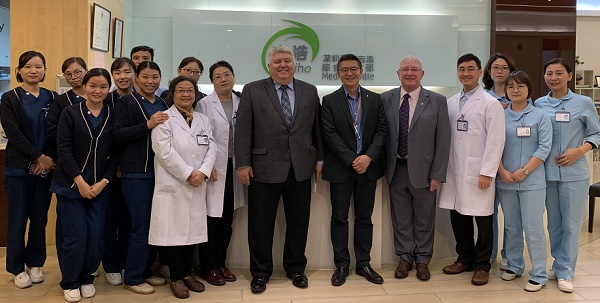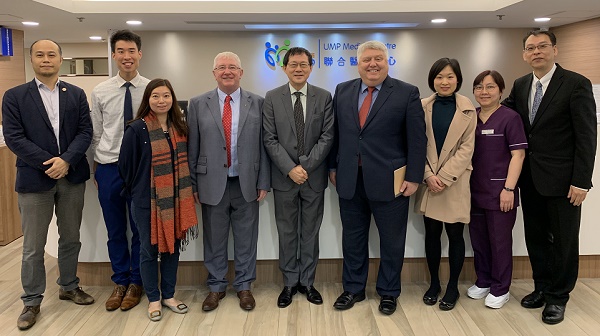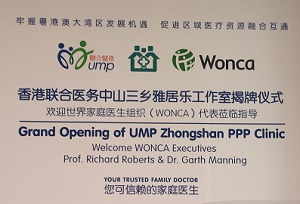From the CEO's desk: Practice Accreditation- Hong Kong/China
 Photo: Garth Manning and Rich Roberts on a clinic visit in Shenzhen
Photo: Garth Manning and Rich Roberts on a clinic visit in Shenzhen
Last year I wrote about a visit undertaken by Professor Rich Roberts and me, when we visited China to undertake practice accreditation visits to Beijing and Shanghai, using the newly developed WONCA Global Standards for Practice Accreditation.
These visits stimulated additional interest and so we were invited back in February this year to formally assess one clinic in Hong Kong and two in Shenzhen. There has also been increased interest from a number of government clinics in China and the team visited a number of these, to informally assess with a view to future formal accreditation.
 Hong Kong
Hong Kong
Our visit began in Hong Kong, where we were briefed by colleagues from UMP Healthcare (photo at right), the company which runs and operates the eight clinics previously accredited. This time they had also requested accreditation of their flagship clinic in the central district of Hong Kong, and the visit began with a briefing from the UMP team, covering general philosophy, their expansion plans since we had last visited and a full briefing on Central Clinic itself.
The
WONCA Global Standards for Practice Accreditation, endorsed by Executive in 2017, look at four key areas of practice:
1. Practitioners – assessing the qualifications, experience and training of the doctors, nurses and other health professional staff in the practice who are providing primary health care services.
2. Patients – ensuring that the patients in the practice are being offered respectful and culturally appropriate care, with due regard for informed choice and patient feedback.
3. Practice Operations – evaluating the use of patient health records (ideally electronic), collection and use of health data, and ensuring that there are systems in place for follow-up of tests and results, practice information, health promotion and preventive care.
4. Premises – confirming that practice facilities meet the standards, that practice equipment meets basic minima and that there is safe and quality use and storage of medicines and vaccines.
The formal assessment of Central Clinic confirmed that it met all WONCA standards. Not all health records are electronic, but a process is under way to digitalise all paper records through time.
Shenzhen
Shenzhen is an amazing city. A fishing village of 5,000 around 40 years ago it is now a major metropolis of over 20,000,000, and home to many of China’s high-tech industries.
The team started the visit with a briefing from Dr Hubert Wong, owner of the two clinics being assessed. Dr Wong is a Hong Kong-based and residency-trained family doctor who opened the Chi Ho Clinic in 2010 and the Shekou Clinic in 2017. As well as the comprehensive documentation his team had produced in advance of the visit, Dr Wong gave the team a very full briefing on the clinics and his aims and aspirations for family medicine development in China.
The formal assessment of both clinics confirmed excellent facilities and practices, with all WONCA standards easily met. What was more important and relevant though was the leadership provided by Dr Wong. He is clearly a very committed and inspiring family doctor. He has a very clear vison and concept of high quality comprehensive continuing care, and the standard of his clinics reflects that commitment.
Chinese Government Clinics
The WONCA team had also been asked to visit a number of government clinics in the Greater Bay Area (GBA), to assess them for possible future WONCA accreditation. The "Greater Bay Area" refers to the Chinese government's scheme to link a number of cities in the Pearl River Delta (including Hong Kong and Macau) into an integrated economic and business hub.
The visit started in Guangzhou where the team visited four clinics – Panyu Luopu; Panyu Nancun; Zhongcun and Luoxi New Town. Most of these clinics have made good progress in developing and providing a family medicine model of care and the first clinic in particular (Panyu Luopu) demonstrated excellent facilities and services.

The team moved on to Zhongshan and had the opportunity to attend the official opening of the remodelled “Agile Community Health Service Station of San Xiang Town” (photo of welcome signage at right). The District Chief (Mr He) is most impressive, and really keen to develop Family Medicine services in his district (one of 24 in Zhongshan) and to have the better examples of his clinics accredited by WONCA.
Finally the team visited Dongguan, where authorities are keenly promoting and developing family medicine services. They have agreed to sponsor 30 doctors to undertake the ‘GOLD’ CPD programme (see below) and also want to enhance health centres and service delivery in order to achieve WONCA accreditation.. Mr Ye Xiang Yang, Director General of the Dongguan Municipal Health Bureau, met with me on Friday 22nd February for very useful discussions, and also met with Dr Donald Li at a separate event (in Shenzhen) on 25th February. On both occasions he emphasised his commitment to make Dongguan one of the leading providers of quality Family Medicine services, and we look forward to future collaboration with him and the health bureau.
Continuing Professional Development (CPD) in China
A significant barrier to access to high quality primary care in China is the paucity of qualified family doctors, with many primary care centres staffed by physicians from other specialities. To upgrade their primary care skills, GOLD (General Practice Oriented Learning and Development) was developed by Dr Kenny Kung, a residency trained family doctor who was previously at the University of Hong Kong and now with UMP Healthcare. The GOLD programme consists of a pre-assessment of aptitude (MCQ, MRC); a two-week orientation on communication and physical examination skills; 52 weekly training modules; weekly MCQs in English (which visa examinations require); case writing, ongoing assessment; and final overall evaluation. UMP China doctors are expected to complete the curriculum in one year. Every Thursday, at noon for one hour, all doctors in UMP China participate in a Webex educational session that focuses on practical solutions to common primary care problems. The WONCA review team observed one such session during their April 2018 visit.
Government clinics are increasingly keen for their doctors to undertake this GOLD programme – which has recently been formally accredited by the UK’s Royal College of General Practitioners – as they have recognised its value in updating their doctors’ knowledge, skills and attitudes. Feedback from participants has been very positive to date, and there have been numerous applicants for the limited number of places available. The WONCA team regards this CPD development as a positive step in helping to upskill Chinese doctors in the quest for better quality and more comprehensive services at a community level and we commend UMP for their work in developing and implementing this programme.
WONCA Team Conclusions
The WONCA team was grateful for the hospitality and assistance given them throughout the entire visit. The team has recommended WONCA accreditation of the three clinics formally assessed and this has been confirmed by Dr Anna Stavdal (Dr Donald Li, being Hong Kong based, could not sign off on a Hong Kong clinic).
The team was also impressed and encouraged by the great strides taken in a number of government health clinics in the Greater Bay Area and believes that many either already meet WONCA standards or will do so with minor modifications. What was clear throughout the entire visit was how important strong leadership is in identifying the changes needed and then providing leadership to the staff to make those changes and to embrace the new concept of working. We look forward very much to receiving requests for formal accreditation from a number of these clinics and plan to return to the Greater Bay Area in July for further visits and discussions.
Forthcoming Activities
April sees the first face-to-face meeting of the 2018-20 WONCA Executive. This will take place in Beijing from 17th to 19th April, to coincide with a large national conference run by the Chinese Medical Doctors’ Association (a WONCA Member Organisation). WONCA Executive will take part in one major session of the conference and will provide a number of participants to a panel discussion on family medicine development.
May is inevitably a busy month for WONCA Executive, and this May is even busier than usual. Dr Anna Stavdal will attend the WONCA Iberoamericana-CIMF Region conference, in Tijuana, Mexico, at the start of the month, whilst the President and I will attend the WONCA Asia Pacific conference, in Kyoto Japan. The three of us, joined by Dr Vivi Martinez Bianchi, will then meet up in Geneva to represent WONCA at the World Health Assembly.
We will, of course report back on all these activities in forthcoming editions of WONCA News.
Until next month.
Garth Manning CEO